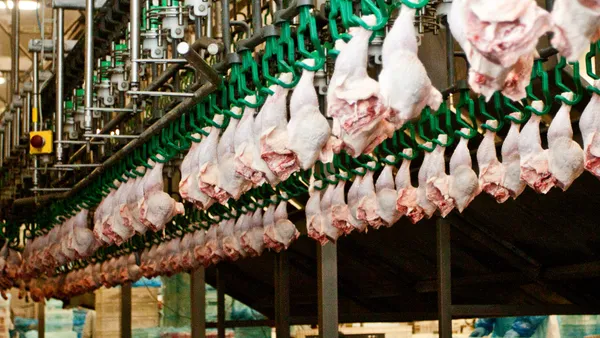Dive Brief:
- Tomato prices could rise more than 50% if the U.S. ends a trade agreement with Mexico, major produce companies warn, as a domestic spat between small farmers and large importers ramps up.
- NatureSweet, a maker of snacking tomatoes, said Tuesday that terminating the 2019 Tomato Suspension Agreement would lead to tariffs of more than 20% on imports from Mexico. Those added costs, in turn, would be passed on to consumers.
- The comments come as U.S. congressmen begin to showcase their support for terminating the agreement. A group of farmers led by the Florida Tomato Exchange petitioned the Department of Commerce in June to end the deal, saying it failed to prevent a flood of cheap tomatoes from entering the country.
Dive Insight:
U.S. tomato farmers want to reimpose antidumping duties on the billions of dollars worth of imports coming from Mexico, arguing that deals to prevent unfair trade practices have remained unenforceable.
The current suspension agreement sets a floor price for tomatoes between the two countries in an effort to help U.S. producers compete and stem a tide of cheap imports from Mexico. The deal is the fifth between the two countries over the last 27 years, and it was negotiated after the International Trade Commission affirmed that imports from Mexico were being sold in the U.S. at less than fair value.
However, U.S. farmers claim that the 2019 agreement remains unenforceable just like the others. Domestic tomato farmers supplied 80% of the domestic market shortly before the first deal was signed in 1996 — now they make up just 30%. Imports rose an additional 9% since the 2019 agreement was signed.
"Suspension agreements might be an effective tool for products that can be kept in storage until market conditions improve," Michael Schadler, executive vice president of the Florida Tomato Exchange, said in June, "but for highly perishable items like fresh tomatoes, there is just too much incentive to evade the reference prices when markets are oversupplied.”
U.S. lawmakers have signaled their support for ending the agreement. A group of 59 Congress members wrote a letter to the Department of Commerce in late September, saying the "imposition of antidumping duties is necessary to stop the destruction of the American tomato industry by unfairly traded Mexican tomatoes."
As the effort to overturn the agreement gains steam, major tomato importers such as NatureSweet are warning of potential consequences to grocery retailers and local border economies.
A study from Arizona State University's business school earlier this month found that grocers would earn almost $7.5 billion less in revenue and that consumer prices would rise an average of 52% if all imports from Mexico were to disappear from the U.S. market. If supply from Mexico was cut in half, prices would rise 26% on average.
“Tomatoes imported from Mexico generate economic and social value far beyond their retail price,” said Skip Hulett, vice president and general counsel for NatureSweet. “Terminating the suspension agreement will come at a cost that far outweighs the benefits for consumers, retailers, and agricultural workers.”











